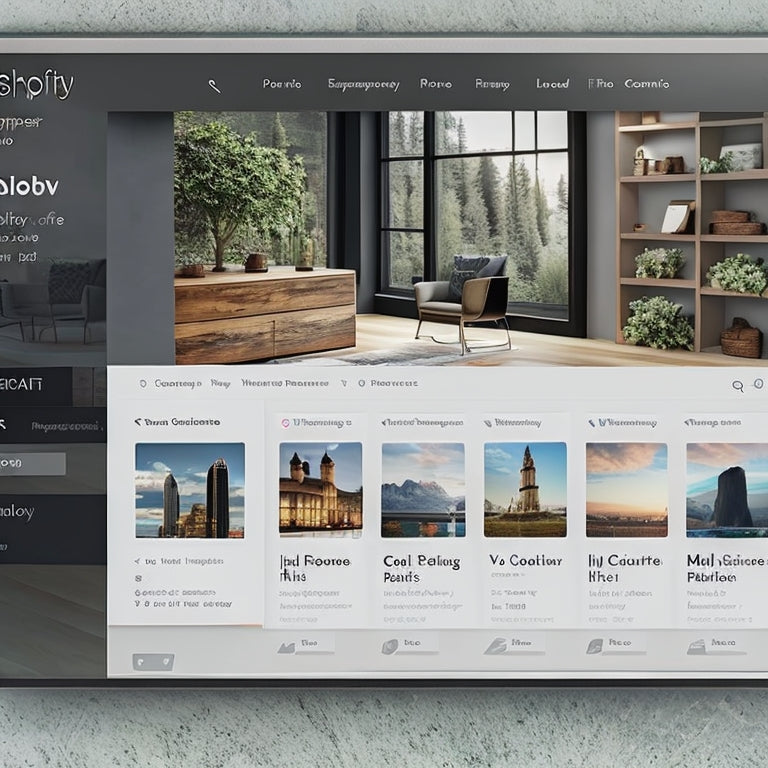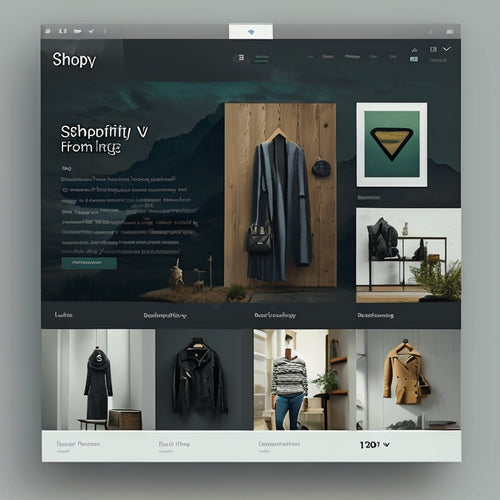
What Is the Best Form Builder for Shopify
Share
This article aims to provide an objective evaluation of the various form builders available for Shopify, focusing on identifying the best option.
By examining the benefits of using a form builder for Shopify, offering tips for selecting the most suitable one, and providing helpful tutorials, this article seeks to inform readers about the advantages and features of different form builders.
Additionally, pricing options for Shopify form builders will be discussed, allowing readers to make an informed decision based on their specific needs and preferences.
- Increased customer engagement is crucial for the success of online stores and can be achieved through interactive and personalized forms.
- Streamlined data collection processes are fundamental for optimizing online store performance and enhancing customer engagement.
- Improved lead generation is essential for driving business growth and expanding the customer base, and can be achieved by leveraging customer feedback and optimizing lead generation strategies.
- Enhanced customization options, such as advanced design options and unique branding, create a distinct identity that resonates with the target audience and fosters a strong brand-customer relationship.
Benefits of Using a Form Builder for Shopify
The use of a form builder for Shopify offers several benefits to businesses.
Firstly, it can significantly increase customer engagement by allowing for interactive and personalized forms that capture the attention of users.
Additionally, a form builder streamlines data collection processes, ensuring that accurate and relevant information is gathered efficiently.
Moreover, it improves lead generation by providing customizable forms that can be tailored to specific target audiences, resulting in higher quality leads.
Furthermore, a form builder enhances customization options, allowing businesses to create forms that align with their branding and design preferences.
Lastly, it simplifies order management by automating the process of capturing customer information and integrating it seamlessly into the back-end system.
Increased Customer Engagement
Enhanced customer engagement is a crucial factor in the success of any online store. It plays a significant role in building customer loyalty and improving conversion rate optimization.
Customer engagement refers to the level of interaction and involvement that customers have with a brand or online store. It includes various activities such as leaving reviews, participating in discussions, and sharing content on social media platforms.
By actively engaging with customers, online stores can foster a sense of belonging and create a positive shopping experience. This, in turn, leads to increased customer loyalty and higher conversion rates.
Implementing strategies to enhance customer engagement, such as personalized recommendations, responsive customer support, and targeted marketing campaigns, can significantly impact the overall performance of an online store and contribute to its long-term success.
Streamlined Data Collection
Streamlined data collection is a fundamental aspect of optimizing online store performance and enhancing customer engagement. In the context of e-commerce, data security plays a crucial role in maintaining trust and credibility with customers. Ensuring that customer data is protected from unauthorized access and breaches is of paramount importance. Implementing robust security measures such as encryption and secure data storage protocols can help safeguard sensitive information.
Additionally, form analytics provide valuable insights into customer behavior and preferences. By analyzing data collected through forms, online store owners can gain a better understanding of their customers, enabling them to tailor their offerings and improve the overall shopping experience. These analytics can provide valuable information on conversion rates, customer demographics, and purchasing patterns, allowing for targeted marketing strategies and personalized recommendations.
Ultimately, streamlined data collection, coupled with strong data security measures and form analytics, can significantly contribute to the success and growth of an online store.
Improved Lead Generation
Improved lead generation is a pivotal factor in driving business growth and expanding the customer base in the e-commerce industry. In order to achieve improved conversion rates, it is essential for businesses to focus on generating a higher number of high-quality leads.
One effective way to accomplish this is by leveraging customer feedback. By actively soliciting and analyzing customer feedback, businesses can gain valuable insights into their target audience's preferences and pain points. This information can then be used to optimize lead generation strategies, tailor marketing campaigns, and improve overall customer experience.
Enhanced Customization Options
One important aspect to consider in the e-commerce industry is the availability of diverse customization options for customers.
Advanced design and unique branding play a crucial role in enhancing the overall customer experience. With advanced design options, customers can personalize their online shopping experience, making it more tailored to their preferences. This can include choosing a specific layout, color scheme, or font style that aligns with their brand image.
Additionally, unique branding options allow businesses to differentiate themselves from competitors by creating a distinct identity that resonates with their target audience. This can be achieved through custom logos, banners, and product images that reflect the brand's values and personality.
Overall, providing customers with advanced design and unique branding options fosters a sense of belonging and builds a strong brand-customer relationship.
Simplified Order Management
Simplified order management is a critical aspect of the e-commerce industry, allowing businesses to efficiently process and track customer orders from placement to fulfillment. It encompasses various tasks, including order processing, inventory management, and shipping coordination.
A streamlined order management system facilitates the effective handling of customer orders, ensuring that they are fulfilled accurately and promptly. One key aspect of simplified order management is automated inventory management. By integrating this feature into the order management system, businesses can automatically update their inventory levels as orders are received and fulfilled.
This automation reduces the risk of overselling or running out of stock, ultimately enhancing customer satisfaction. Additionally, automated inventory management enables businesses to have real-time visibility of their inventory levels, providing insights for decision-making and ensuring efficient stock replenishment.
Overall, simplified order management, coupled with automated inventory management, plays a crucial role in the smooth operation of e-commerce businesses, fostering customer loyalty and enabling sustainable growth.
Tips for Choosing a Form Builder for Shopify
When choosing a form builder for Shopify, it is important to consider the balance between price and features. Some form builders may offer more advanced features but come at a higher price, while others may have a lower price point but offer fewer features.
Another crucial aspect to consider is the customization options available with the form builder. The ability to customize the form's design and layout to match the brand's aesthetic is essential for creating a seamless user experience.
Additionally, integration with Shopify is a key factor to evaluate as it ensures smooth data synchronization between the form builder and the Shopify platform.
Lastly, a user-friendly interface is crucial for both the store owner and the customers, as it simplifies the form creation process and enhances the overall usability of the form builder.
Price Vs. Features
The comparison between price and features is a key aspect to consider when determining the best form builder for Shopify. A price comparison allows users to evaluate the cost-effectiveness of different form builders available in the market. It is important to consider the pricing plans offered by each form builder and analyze if they align with the budgetary constraints of the user.
Simultaneously, a thorough feature analysis is essential as it helps users determine the functionality and capabilities of the form builder. This includes examining features such as form customization options, integrations with other apps, and support for advanced form elements.
Customization Options
Customization options play a crucial role in evaluating the functionality and flexibility of a form builder for Shopify. The ability to customize forms according to specific requirements is an essential consideration for businesses seeking to create a unique and tailored user experience.
Advanced features offered by form builders enable users to design forms that align with their brand identity and capture the desired data. These features may include customizable themes, fonts, colors, and layouts, allowing businesses to create visually appealing and cohesive forms that resonate with their target audience.
Design flexibility is another important aspect of customization options. Form builders that offer drag-and-drop functionality, conditional logic, and the ability to add custom fields empower businesses to create dynamic and interactive forms that enhance user engagement.
Therefore, when evaluating form builders for Shopify, it is crucial to consider the availability of advanced features and design flexibility to ensure the creation of highly customizable and visually appealing forms.
Integration With Shopify
Integration with the Shopify platform is a crucial consideration for businesses looking to seamlessly incorporate a form builder into their existing e-commerce infrastructure.
The integration benefits of using a form builder that is compatible with Shopify are numerous. Firstly, it allows for a streamlined and efficient process of collecting customer data, such as contact information, preferences, and feedback. This data can then be used to personalize the customer experience, optimize marketing strategies, and improve overall business performance.
Furthermore, integration with Shopify ensures that the form builder seamlessly integrates with the existing user interface design of the online store. This means that the forms will be visually consistent with the overall branding and design of the website, providing a cohesive and professional user experience.
Overall, integrating a form builder with the Shopify platform offers significant advantages in terms of data collection and user interface design.
User-Friendly Interface
User-friendly interfaces are essential for ensuring a smooth and intuitive experience for customers when interacting with online platforms. In the context of form builders for Shopify, a user-friendly interface plays a crucial role in enhancing the overall user experience.
A well-designed interface allows users to easily navigate through the form builder, making it effortless to create and customize forms according to their specific requirements. It provides clear instructions, intuitive design options, and a visually appealing layout that promotes ease of use.
By offering a range of design options, such as customizable themes, color schemes, and font choices, users can create forms that align with their brand identity and aesthetics.
A user-friendly interface also includes features like drag-and-drop functionality, real-time previews, and responsive designs, ensuring a seamless experience across different devices.
Helpful Tutorials for Shopify Form Builder
One of the important aspects of a Shopify form builder is the availability of helpful tutorials to guide users in effectively utilizing the tool. These tutorials provide step-by-step guides that assist users in creating and customizing forms for their Shopify stores.
The tutorials cover various topics such as form design, field customization, form embedding, and form submission management. They provide detailed explanations and instructions on how to navigate the form builder interface, add different form elements, set up conditional logic, and integrate the forms with other apps or platforms.
The tutorials also address common issues or challenges users may encounter during the form building process and provide troubleshooting tips. Overall, these helpful tutorials ensure that users have the necessary guidance and support to make the most of the Shopify form builder and create professional and functional forms for their online stores.
Learn More: Pricing Options for Shopify Form Builders
In order to make an informed decision about which form builder to choose for your Shopify store, it is important to consider the pricing options available. Shopify offers a variety of form builders, each with its own pricing structure. Understanding the cost comparison between different form builders can help you determine which one best suits your budget and needs.
When comparing Shopify form builder pricing, it is essential to consider factors such as the number of forms you can create, the features and functionalities offered, and any additional services or integrations included. Some form builders may offer tiered pricing plans based on the number of submissions or users, while others may charge a flat fee or offer a free basic version with limited features.
Frequently Asked Questions
Can I Integrate the Form Builder With My Existing Shopify Theme?
Integrating a form builder with an existing Shopify theme allows for seamless incorporation of customized forms. This integration optimizes the form submission process, enhancing user experience and facilitating data collection for the website owner.
Will Using a Form Builder Affect the Loading Speed of My Shopify Store?
The loading speed of a Shopify store can be optimized by implementing various techniques. A fast loading speed is crucial for online stores as it enhances user experience, reduces bounce rate, and improves search engine rankings.
Are There Any Limitations on the Number of Forms I Can Create Using the Form Builder?
The limitations on a form builder for Shopify may vary depending on the specific app chosen. However, using a form builder can offer benefits such as increased customization options and improved customer data collection.
Can I Customize the Design of the Forms Created With the Form Builder?
Customization options are available with the form builder, allowing users to modify the design of their forms. These options include advanced features such as color customization, font selection, and layout adjustments to meet specific branding or aesthetic preferences.
Is It Possible to Collect Payments Through the Forms Created With the Form Builder?
This form builder offers payment options for collecting payments, allowing users to set up different payment methods. To ensure secure payment transactions, the form builder incorporates various security measures, ensuring the safety and integrity of the payment process.
Related Posts
-

Why Business Owners Need Online Learning Platforms
You need an online learning platform to stay ahead of the curve in today's fast-paced business environment, where ada...
-

Are Shopify Apps Necessary
This article examines the necessity of Shopify apps within the context of e-commerce. It analyzes the benefits of ut...
-

Setting Up TikTok Storefront on Shopify: A Guide
The integration of social media platforms and e-commerce has become increasingly prevalent in the digital marketplac...


